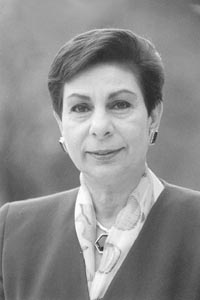The HyperTexts
Hanan Ashrawi
Dr. Hanan Ashrawi has been a central player in the struggle for a Palestinian homeland. A tireless campaigner for human rights, she has distinguished herself
in both the academic and political arenas. Her academic expertise has played a vital role in the development and recognition of Palestinian culture, while her
longstanding political activism on behalf of the Palestinian people has contributed greatly to the establishment of an independent and self-governing Palestine.
Dr. Ashrawi received her Bachelor and Master's degrees in literature in the Department of English at the American University of Beirut. After earning her
Ph.D. in Medieval and Comparative Literature from the University of Virginia, Charlottesville, Dr. Ashrawi returned to her homeland in 1973 to establish the
Department of English at Birzeit University on the West Bank. She edited the Anthology of Palestinian Literature.
She
is the author of The Modern Palestinian Short Story: An Introduction to Practical Criticism; Contemporary Palestinian Literature under Occupation; Contemporary
Palestinian Poetry and Fiction; and Literary Translation: Theory and Practice.
If you are a student, teacher, educator, peace activist or just someone who cares and wants to help, please read
How Can We End Ethnic Cleansing and Genocide Forever? and do what you can to make the world a safer, happier place for children of
all races and creeds.
Hadeel's Song
Some words are hard to pronounce—
He-li-cop-ter
is most vexing
(A-pa-che or Co-bra is impossible)
But how it can stand still in the sky
I cannot understand—
What holds it up
What bears its weight
(Not clouds, I know)
It sends a flashing light—so smooth—
It makes a deafening sound
The house shakes
(There are holes in the wall by my bed)
Flash-boom-light-sound—
And I have a hard time sleeping
(I felt ashamed when I wet my bed, but no one scolded me).
Plane—a word much easier to say—
It flies, tayyara,
My mother told me
A word must have a meaning
A name must have a meaning
Like mine,
(Hadeel, the cooing of the dove)
Tanks, though, make a different sound
They shudder when they shoot
Dabbabeh is a heavy word
As
heavy as its meaning.
Hadeel—the dove—she coos
Tayyara—she flies
Dabbabeh—she crawls
My Mother—she cries
And cries and cries
My Brother—Rami—he lies
DEAD
And lies and lies, his eyes
Closed.
Hit by a bullet in the head
(bullet is a female lead—rasasa—she kills,
my pencil is a male lead—rasas—he writes)
What’s the difference between a shell and a bullet?
(What’s five-hundred-milli-meter-
Or eight-hundred-milli-meter-shell?)
Numbers are more vexing than words—
I count to ten, then ten-and-one, ten-and-two
But what happens after ten-and-ten,
How should I know?
Rami, my brother, was one
Of hundreds killed—
They say thousands are hurt,
But which is more
A hundred or a thousand (miyyeh or alf)
I cannot tell—
So big—so large—so huge—
Too many, too much.
Palestine—Falasteen—I’m used to,
It’s not so hard to say,
It means we’re here—to stay—
Even though the place is hard
On kids and mothers too
For soldiers shoot
And airplanes shell
And tanks boom
And tear gas makes you cry
(Though I don’t think it’s tear gas that makes my mother cry)
I’d better go and hug her
Sit in her lap a while
Touch her face (my fingers wet)
Look in her eyes
Until I see myself again
A girl within her mother’s sight.
If words have meaning, Mama,
What is Is-ra-el?
What does a word mean
if it is mixed
with another—
If all soldiers, tanks, planes and guns are
Is-ra-el-i
What are they doing here
In a place I know
In a word I know—(Palestine)
In a life that I no longer know?
From the Diary
of an Almost-Four-Year-Old
Tomorrow, the bandages
will come off. I wonder
will I see half an orange,
half an apple, half my
mother's face
with my one remaining eye?
I did not see the bullet
but felt its pain
exploding in my head.
His image did not
vanish, the soldier
with a big gun, unsteady
hands, and a look in
his eyes
I could not understand.
If I can see him so clearly
with my eyes closed,
it could be that inside our heads
we each have one spare set
of eyes
to make up for the ones we lose.
Next month, on my birthday,
I'll have a brand new glass eye,
maybe things will look round
and fat in the middle —
I've gazed through all my marbles,
they made the world look strange.
I hear a nine-month-old
has also lost an eye,
I wonder if my soldier
shot her too—a soldier
looking for little girls who
look him in the eye—
I'm old enough, almost four,
I've seen enough of life,
but she's just a baby
who didn't know any better.
The HyperTexts
